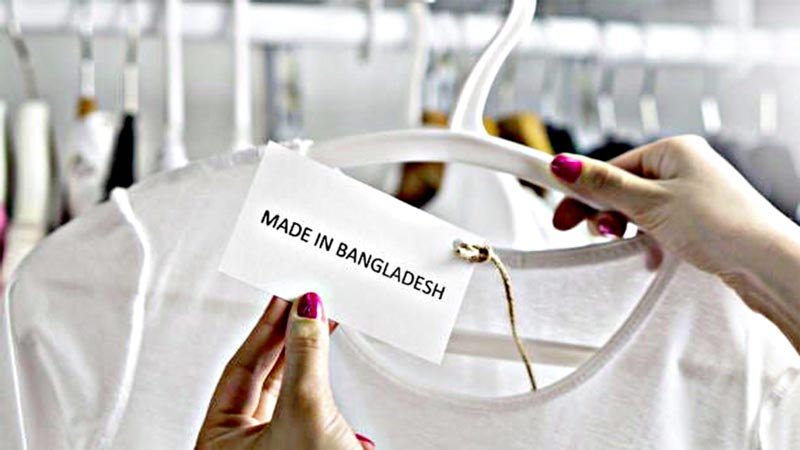Shuvonkar Karmokar, Dhaka: Bangladesh is struggling to move beyond low-end readymade garment (RMG) products while exporting to the United States (US) and European markets. The situation has turned so acute that the country now ranks third on the list of low-cost RMG product exporting countries, following China and Pakistan.
Now, Bangladesh is the world’s second-largest exporter of RMG products, but its lower-ranked competitors, including India, Vietnam, Sri Lanka, Turkey, Indonesia, and Morocco, are selling products at comparatively higher prices.
The scenario was obtained in an analysis on the markets in the US and European Union (EU) countries.
In 2022, China turned out to be the top exporter with RMG product exports worth USD 182 billion, followed by Bangladesh with exports of USD 45.71 billion.
However, the two major markets showed some discrepancies in product prices. According to the EU statistical office, Eurostat, the average price of clothing exported to the EU in 2022 was USD 22.48 per kilogram (kg). Bangladesh exported RMG products to the market at USD 17.27 per kg, while India and Sri Lanka received prices of USD 23.27 and USD 28.54 per kg respectively. Pakistan exported products at a rate of USD 14.47 per kg.
The US office of textiles and apparel (OTEXA) also presented a similar price chart. Here, the average price of clothing imported from different countries was at USD 3.21 per square meter. Bangladesh exported RMG products at a price of USD 3.10 per square meter, while India and Sri Lanka got prices of USD 3.80 and USD 4.26 per square meter respectively.
In the US market, China exported clothes at a strikingly low price of USD 2.02 per square meter, while Pakistan at USD 3.03 per square meter. Fazlul Haque, former president of Bangladesh Knitwear Manufacturers and Exporters Association (BKMEA), said, “Of course this is unfavourable for us. In fact, it will not be an exaggeration to describe it as disastrous. The prices of the clothing we manufacture are lower compared to other nations due to our poor bargaining skills.”
“We enjoy a duty-free privilege for garment exports to the EU market and we were supposed to get higher prices for our products, compared to the nations without the advantage. But we are receiving prices lower by around 15 to 16 per cent in the EU market,” he added.
The former BKMEA leader further said, “When we offer a clothing item for USD 10, India is selling the same item at USD 12. Actually, India is getting good prices due to its adept bargaining skills. In the coming days, the wages of our garment workers will go up, in addition to other expenses. Then, our entrepreneurs must enhance their bargaining skills to keep their business afloat.”
Lack of diversity
The garment industry in Bangladesh is largely dependent on a few sectors, with 80 per cent of apparel exports stemming from just five certain sectors. The total apparel exports totaled at USD 46.99 billion in the fiscal year 2022-23, where exports of trousers, T-shirts, knitted shirts, sweaters, regular shirts and blouses, and underwear constituted USD 37.75 billion.
However, there are some RMG factories that export high-end products, including blazers, jeans pants, jackets, and T-shirts. For instance, Snowtex Group gets USD 10 to 50 for a jacket.
SM Khaled, managing director of Snowtex Group, said, “Our factories are making investments to scale up productivity, in addition to producing high-value garments. It is expected to be completed by next 5 to 10 years and then the export of high-end clothing items will increase.”
A readymade garment worker at a factory
He pointed out a number of setbacks, saying, “We are now lagging behind in terms of developing the linkage industry for RMG product exports. We do not have a deep sea port and the large ships cannot navigate to Chattogram. Our exports take longer compared to countries like Vietnam and China. Hence, our entrepreneurs have no choice but to offer lower prices to the clients.”
According to Eurostat data, Bangladesh exported garments weighing 1.32 million kg to the EU in the previous year, with an average price of USD 17.27 per kg. Earlier, the export price for per kg clothing was at USD 15.42 in 2021. Here, the export value rose by nearly 11.95 per cent in the EU market, while the rate is 13 per cent for the US market.
Despite the rise, Bangladesh still remains at the lower end of the list when it comes to clothing prices.
Khondaker Golam Moazzem, research director of the Centre for Policy Dialogue (CPD), said, “Our export basket is predominantly ruled by low-end garment products. In contrast, the export baskets of China, Vietnam, and Indonesia are mainly filled with high-value products. The factories here have expanded their production capacity without conducting a comprehensive market analysis. They now require regular purchase orders to sustain their extensive workforce. Foreign buyers capitalise on this weakness and enjoy advantages during price negotiation.”

